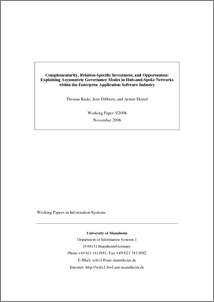|
Complementarity, relation-specific investment, and opportunism : explaining asymmetric governance modes in hub-and-spoke networks within the enterprise application software industry
Kude, Thomas
;
Dibbern, Jens
;
Heinzl, Armin
![[img]](https://madoc.bib.uni-mannheim.de/style/images/fileicons/application_pdf.png)  Vorschau |
|
PDF
Working_Paper_3_2008.pdf
- Veröffentlichte Version
Download (93kB)
|
|
URL:
|
https://ub-madoc.bib.uni-mannheim.de/2276
|
|
URN:
|
urn:nbn:de:bsz:180-madoc-22769
|
|
Dokumenttyp:
|
Arbeitspapier
|
|
Erscheinungsjahr:
|
2008
|
|
Titel einer Zeitschrift oder einer Reihe:
|
None
|
|
Sprache der Veröffentlichung:
|
Englisch
|
|
Einrichtung:
|
Fakultät für Betriebswirtschaftslehre > Sonstige - Fakultät für Betriebswirtschaftslehre
|
|
MADOC-Schriftenreihe:
|
Area Information Systems and Institute for Enterprise Systems > Working Papers Lehrstuhl für ABWL und Wirtschaftsinformatik (Heinzl) (bis 2011)
|
|
Fachgebiet:
|
004 Informatik
|
|
Normierte Schlagwörter (SWD):
|
Softwareindustrie , Investitionspolitik , Hub-and-Spoke-System , Ressourcenabhängigkeitstheorie , Serviceorientierte Architektur
|
|
Freie Schlagwörter (Englisch):
|
Relational View , Resource Dependence Theory , Power Imbalance , Modularity , Service-Oriented Architecture , Software Stack
|
|
Abstract:
|
In the enterprise application software industry, dominant system vendors (hubs) have formed strategic partnerships with small software companies (spokes), resulting in the emergence of hub-and-spoke networks. Based upon the concept of software stacks, we argue that the governance mechanisms applied by hub and spokes depend on the complementarity between hub’s and spoke’s resources. Specifically, we draw on the relational view and combine it with the resource dependence theory to develop a theoretical framework that explains the link between the type of complementarity and differential governance mechanisms. We are able to show that while hubs seek to take advantage of complementarities with the entire network of partners, spokes are primarily interested in gaining access to complementary resources and capabilities of the hub organization. In order to leverage the benefits of resource complementarity, hubs mainly invest in networkspecific resources to generate value. On the contrary, the spokes’ investments are hub-specific. Accordingly, hubs only face minor threats of opportunistic behavior on the part of a specific spoke, whereas the spokes’ existence is endangered by the threat of opportunistic behavior by the hub. Due to these three asymmetries, hubs apply formal governance mechanisms in order to efficiently coordinate the network of spokes, whereas spokes rely on informal governance mechanisms.
|
 | Das Dokument wird vom Publikationsserver der Universitätsbibliothek Mannheim bereitgestellt. |
 Suche Autoren in Suche Autoren in
Sie haben einen Fehler gefunden? Teilen Sie uns Ihren Korrekturwunsch bitte hier mit: E-Mail
Actions (login required)
 |
Eintrag anzeigen |
|
|



 Suche Autoren in
Suche Autoren in